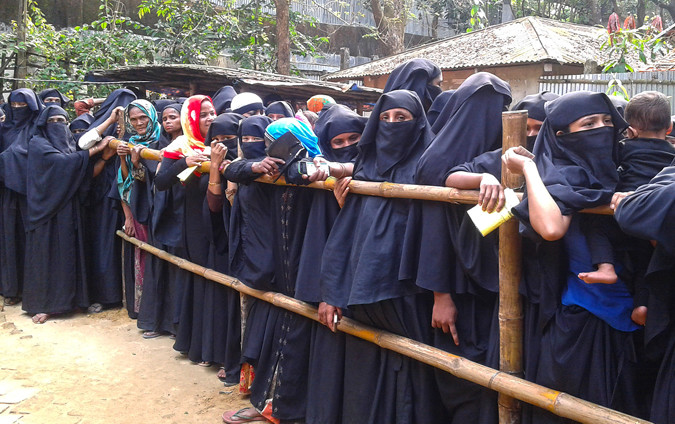Women voters at Rohingya camp
Date:
Author: Christine Hunter
Kutupalong, Bangladesh – Rohingya women and men in Kutupalong refugee camp have a democratically elected camp council for the first time in the history of the camp. For many of the 90 per cent of women who voted it was the first time in their lives that they have cast a ballot.

This small revolution is one result of the joint efforts of UN Women and UNHCR. With funding from IKEA Foundation, UNHCR and UN Women are collaborating to support empowerment of women in the Rohingya refugee camps.
UN Women has been implementing BRIDGE training (Building Resources in Governance, Democracy, Governance and Elections) to develop national capacity to increase women’s participation in elections. Drawing on skills from this training, the Gender Advisor for the refugee camps developed new guidelines for elections in the camps.
The key responsibilities of elected members/Council
- Represent the refugee community and serve as the main link between the Government of Bangladesh, UNHCR and all other stakeholders in constant consultation with camp residents.
- Coordination between Camp Committee and Block Committees and report on a monthly basis about their activities.
- Inform all stakeholders, about the general concerns of refugees, especially related to human rights and protection concerns.
- Promote and maintain harmonious relationships among camp residents and between the camp and the host communities.
- Hold coordination meeting among all community based organizations (women support group, youth groups, men support group, child protection committee, child protection network, WASH committee, schools committee).
- Support CBOs, UNHCR and other stakeholders in mobilizing and sensitizing the refugee community on various issues including SGBV, sanitation, and child protection.
- Refer any case of trafficking, SGBV, child protection or other protection concern that comes to leader’s knowledge according to SOPs and Referral Systems.
- Report to the CIC (Camp-In-Charge) and UNHCR all incidents of violence and illegal activities inside the camp that comes to the committee’s knowledge.
- Support CIC with the implementation of various actions and activities to protect refugees and their rights, as well as promote order and security within the camps.
Through her advocacy and the support of the UNHCR community service team, a system of voting by ballot was introduced, replacing the previous system where representatives were selected by a few influential individuals. Sex-segregated voting (where selected women could vote only for women candidates) was replaced by a system in which women and men both voted for all candidates. For the first time in the history of the camps men seeking office had to speak to women as voters. In the December election 90 per cent of women voted, 35 women ran for elections and 14 were elected (70 men ran and 35 were elected).
For many women and men this was a first experience of a democratic election. For women it was a chance to exercise a choice over decisions that affect their lives.